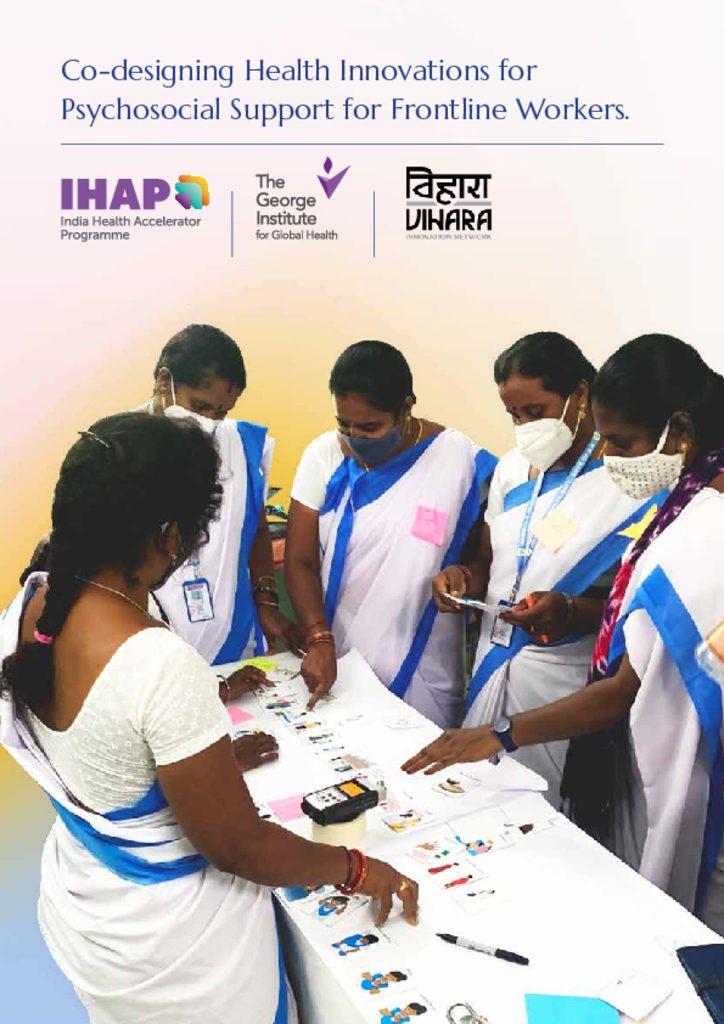
Caring for the caregivers: Co-designing Health Innovations for Psychosocial Support for Frontline Workers
NEW DELHI, MARCH 24: The George Institute’s India Health Accelerator Programme (IHAP) in partnership with Vihara Innovation Network conducted a series of co-design workshops to understand and address the psychosocial stress faced by female frontline healthcare workers (FLWs). The objective of these workshops was to understand how FLWs balanced their official responsibilities and their role as women within their household and engaging with communities. These community based participatory workshops also captured the current coping mechanisms adopted by the FLWs with an aim to design innovative approaches to address the same.
Based on these co-design workshops, a detailed report has been developed which highlights the burden of psychosocial stress experienced by the female frontline workers in responding to COVID-19, with elevated rates of depression, anxiety, posttraumatic stress disorder (PTSD) and self-harm being reported. It was only after several months into the pandemic that the need to support the mental health of frontline workers was recognised the world over. This report outlines potential interventions for the primary care settings towards provide psychosocial support for those on the frontlines during the pandemic. In 2021, the International year dedicated to the health and care workers - UNICEF & The George Institute India Health Accelerator also hosted an innovation challenge to identify disruptive solutions to provide psychosocial support to the health care workers.
“The George Institute’s - India Health Accelerator Programme is aimed at scaling up innovations within health services delivery systems, these co-design workshops helped understand the challenges faced by FLWS. We through this initiative developed and implemented a package of system level interventions towards caring for the caregivers.” says Dr Oommen John, Sr. Research Fellow, who leads the India Health Accelerator Programme.
Vihara Innovation Network’s experience of working with frontline workers helped gather insights to structure the workshop, with due attention to the Covid-19 pandemic. All three workshops were facilitated under three different thematic (Need of Work-Life Balance, Obstructive Work Environment & Community Engagement and Peer Support) over a period of two days across three locations that were met with curiosity, enthusiasm, and warmth.
The report outlines the key strategies to “Care for the Caregivers” and provide them psychosocial support by offering them a safe space and make them feel comfortable to speak about their worries, tensions, and fears without disruptions from work or family. It encourages FLWs to talk about their worries and fears beyond the realm of work gather and helped our team to understand the broad spectrum out the wide range of stressors challenges and psychosocial issues ranging in severity.
“Vihara and The George Institute's collaboration brought to fore the need to look at FLWs’ mental health from a psychosocial perspective and addresses the causes of mental health stressors that often stem from the way social and gender ideologies shaping their lived experiences. The most rewarding aspect of these workshops was the in-person engagement with these brave women. We will be surprised how much of a respite it is for our FLWs when someone truly listens to their challenges and emotions, but this of course is only the first step. We need to do so much more.” says Divya Bhardwaj, Associate Director, Vihara Innovation Network
“Health workers have been at the forefront of the fight against the COVID-19 pandemic. They have also faced a disproportionate burden in terms of health risks for themselves and their families as well as immense mental health challenges. Innovations which bring greater ease and efficiency to the work of health workers or those that monitor their stress levels and provide them with psychosocial support, are of the essence. The time is ripe to identify and scale-up powerful innovations that can make a difference to the lives of these frontline warriors.” says Urvashi Prasad, Director, DMEO, Niti Aayog


